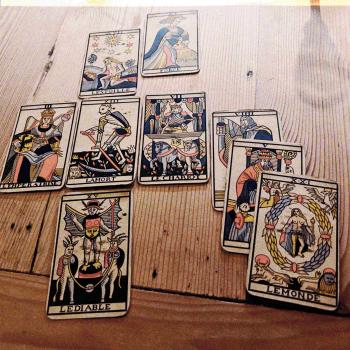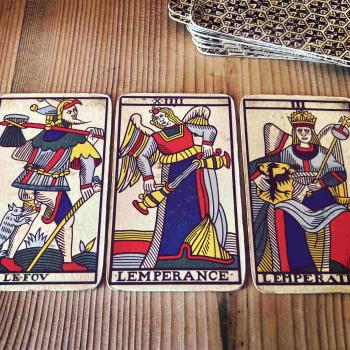
‘My boss is an idiot and we can’t work together, help…’ is a classic situation for a fortuneteller who is called upon to impart her impartial wisdom about the blind spots at stake.
But the inverse of the situation can also occur: ‘Help, my boss is an excellently competent person and there’s mutual recognition of what we do. And yet we clash. There’s some resistance that I can’t comprehend. What do I do?’
I look at two cards: Temperance and the Star. You’d think that these are good cards calling me to recite as if from a dream what the good books dictate, pointing also to a future resolution that’s comforting. ‘Temperance means balance and harmony.’ ‘The Star means inspiration and goodwill.’

Stubbornly I apply the mantra that I share with my students when it comes to recitations: ‘This means that. No, it doesn’t.’
It’s all about what you see, not about what you know.
And this is what I see:
Not on the same page. One is holding water. The other one spills it. So the problem is one of incompatibility. The perceived lack of communication, in spite of excellent competence, leads to lack of cooperation.
In the end, each of these ladies is wasting her time.
I’m enemies with what wastes my time. It’s my biggest challenge threatening my claim to being Zen. If only…
But I’m working on it. What the conscious mind has a hard time perceiving, I allow the visual images of the cards to inform me about. There’s nothing like busting a blind spot, a preconceived or projected idea.
An excellent boss with whom you’re incompatible is not good news. It leads to nothing but trouble. That’s the message. So we’re not here with predicting the restoration of balance à la Temperance and the Star without motivating why exactly we think so. The other hearing this message can do her part. She can go home and reflect on what causes incompatibility and then act accordingly.
Questions at a fortune-teller’s fair
Aradia Academy is organizing an online Fortune-teller’s Fair featuring alumni reading like the Devil for 6 hours straight. 17 of them. You’re welcome to participate. You can try the skills and wisdom of a few fortune-tellers, dedicating as little as 10 seconds on the event, having your greatest question answered in a snap, or all of them, staying onboard for the whole duration.
20 bucks will give you access to a secret Facebook group where all 17 fortunetellers will be on shifts and ready to answer all the questions you might come up with. Check it out, and think of your questions. What will you ask?
To help you out with this one, as it may seem daunting to have so many questions in one day, I’ve formulated some thoughts about the questions you can ask your favorite fortuneteller, questions that can help you in all other divination situations.

What kind of questions can you ask?
Classical questions can be divided into areas of concern with love, money, health, and work. But they can also follow more specific themes.
‘Does he love me?’, can turn into a question about resentment, dependability, or about how to cope with a parasitical, unrealistic thought about what’s expected.
Questions about work can also follow the more specific theme of how to create and experience a symmetrical relationship, as in the situation when you extend yourself to making two steps towards fulfilling your duties over and above what’s stipulated in your contract and you want to see that your boss also makes two steps towards acknowledging your particular effort that goes into it.
Health questions can follow the theme if causality. What if it’s not a physical condition that causes you to shit blood? What if it’s stress? And if that’s the case, what particular area in your life has become so resisting to knowing it, resisting your conscious mind, that you can’t even put your finger on it? As a general rule, what you don’t know, you can’t control, so it’s a problem.
Questions about money can easily follow the theme of mobility, migration, and transition. A good question to pose in this direction is one that helps you realize that it’s not here that you’ll make more money but somewhere else. Where is this place, and what must you fulfil to get there? More money is not always about how to ingratiate yourself so you get a raise, but rather about how to eradicate your fear of changing lanes or geographical landscapes.
Questions can also be of predictive nature, or of a more metaphysical nature. You can go from: ‘What will I have for breakfast tomorrow?’ to pondering on ‘what’s the meaning of life’ while you’re eating cornflakes, a choice that you’ve just divined for yesterday.
Questions can have a descriptive character. Asking a ‘what’ question will give you insight that describes a situation: ‘What’s the situation here?’
Questions can be analytical. Asking a ‘how’ question will give you insight into the necessary steps you can take towards solving a problem: ‘How will I cope with no income in the next month?’ can disclose very concretely what is a good idea to perform.
Questions can be of reflective nature. Asking a ‘why’ question will give you access to depth and understanding: ‘Why did he leave me’, can send you reflecting on what went wrong, making you comprehend why you’re feeling the way you do.
Generally, you can also ask questions that combine the field of emotion with a practical level. You can use deduction to connect the dots or to create connection to others.
You can use a question to transmit knowledge about a situation that you’re unsure of, that is to say, by formulating a coherent question you participate invariably in making clear what’s unconscious or vague in your head.
You can use questions to strengthen your trust in others, or to strengthen your faith in your own clear judgment, perhaps even about the value of self-reliance, in which case trust in others is eradicated or deemed redundant.
Mostly questions have a coping or a strategic character, as in, ‘how do I do this concretely?’ but it can pay off to pose some questions that have an investigative nature into the underlying premise and structure of what ‘this’ is exactly to begin with.
‘How do I put up with my imbecile boss’ is a question that presupposes clear knowledge and insight into another person’s motivations, actions, and psychological mindset. Are you sure that when you deem the boss to be an imbecile that is also the case? And what if the boss’s imbecility is directly a manifestation of the way in which you are or act on the job?
Asking questions is easy. Asking the right questions is hard. And then there are the questions that arise from the encounter with the fortuneteller, with the beauty of her words, inspiration, and sincerity.
‘Why aren’t you promising me anything?’, you’d want to know, but you’ll find yourself settled in truth with her answer: ‘Because there’s no tomorrow’.
♠
There’s a limit to how many we can accommodate at the fair – up to 200 people – so you may consider getting your ticket in good time – 25 of them are gone already.
Otherwise, and in addition to getting excellent value for your money, I hope you’ll try this fair for the sheer pleasure of seeing devilish readers who have followed my instruction read in their own brilliant way. A method is only good when it’s applied by a thoughtful and original thinker. That’s what I teach, and that’s what I want to see in action.
















